Who was Marcus Aurelius and why listen to him?

Marcus Aurelius was the most powerful and important man in the world. He was emperor of Rome for almost two decades starting in the year 161 A.D.
Although Marcus was a powerful ruler, his problems appear to be surprisingly similar to the problems we all face daily. For example,
- He felt anxious about his son getting sick,
- He worried about other people’s opinions,
- He tried not to get angry with selfish people,
and most importantly… - He had trouble sometimes climbing out of his comfy bed.
Well, that’s probably why this book is still popular today, despite being written so long ago. The writing is clear and direct. It’s just good ole Marcus Aurelius talking to himself, struggling with life problems that we all face. Oh, and launching a few wars on the side too. Can’t forget that…
One of the most fascinating things about this book is that Marcus almost definitely never meant for these notes to become public. To me, that makes this book even more special. Where else can you read the true private innermost thoughts of the most powerful leader in the world?
This is technically a “philosophy” book. Now, most people today hear the word philosophy and their brain shuts off. I don’t blame you. When I hear philosophy, I imagine old men arguing for hours in some university tower about the definition of a word. But in the ancient Roman times, philosophy was a very practical thing, a tool you could use to handle life’s everyday stresses, challenges and problems. (Later in history, religion would take this place in most people’s lives giving them moral principles and rules to follow.)
So now you know a little about our good boy Marcus, let’s jump into a summary of the best lessons from Meditations…
🧠 1. Discipline Your Inner Self: Be a wise parent to your impulsive ‘inner teenager’ to live a good life
Just like all of us, there was a voice inside Marcus Aurelius’s head that wanted nothing more than to be lazy and overindulge. Marcus saw it as his duty to parent, coach or discipline that inner teenager.
In parts of Meditations, it sounds like Marcus’s inner adult is arguing directly with his inner teenager. For example, at one point he’s talking about what to do if you have trouble getting out of bed in the morning. Then another voice interrupts and whines “But it’s nicer here” and the first voice responds:
So you were born to feel “nice”? Instead of doing things and experiencing them? Don’t you see the plants, the birds, the ants and spiders and bees going about their individual tasks, putting the world in order, as best they can?
Notice the tone of this writing. His inner adult is chastising the other part of himself that just wants to sleep in. You can almost hear the judgement in his voice. “So you were born to feel ‘nice’?” And then this voice continues by explaining that every living creature has some purpose it is born to do. In the same way, a human being is not born to lay in bed, but to get up and be useful to other human beings. The writing continues like this:
You don’t love yourself enough. Or you’d love your nature too, and what it demands of you. People who love what they do wear themselves down doing it, they even forget to wash or eat. Do you have less respect for your own nature than the engraver does for engraving, the dancer for the dance, the miser for money or the social climber for status? […] Is helping others less valuable to you? Not worth your effort?
We all have multiple conflicting motivations inside of us. We want to go to the gym, but we want to eat doughnuts. We want to get a PhD, but we also want to achieve level 50 in the new video game. In these situations, one of these motivations will win out eventually. Marcus knew this so he directly confronted the voices of his lower motivations. It’s just like a parent telling their kid that NO, they cannot have ice cream for every meal because eventually their teeth will rot out.
And we see this pattern repeating over and over again in the book, with Marcus using rational thinking to resist his base-level impulses.
By the way, this process is very similar to modern-day cognitive behavioral therapy. Therapists actually guide their patients to use rational thinking to inhibit the impulses generated from the more emotional and reactive parts of their minds. And they can actually see this process happening on a brain scanner. For example, anxiety is caused when a small part of the brain called the amygdala becomes activated, and then the rational thinking part of the brain called the prefrontal cortex starts firing and calms down the amygdala. The brain is a fascinating subject and you can learn a lot more in our summary of Behave by Robert Sapolsky, a Stanford professor and expert in human behavioral biology.
Even an emperor like Marcus had a part of himself that wanted to be like a teenager: lazy, undisciplined and laying in bed all day. He spent time rationally explaining to himself why certain actions would be bad for him in the long term. Just like a parent explaining to their child why they can’t eat ice cream every day.
💀 2. Remember death: Thinking about our mortality helps you stop worrying about what people think and prioritize what truly matters
You could leave life right now. Let that determine what you say and think.
Being an emperor, Marcus Aurelius faced a LOT more social pressure than most of us ever will. To put it into perspective, lots of very powerful people wanted him either publicly humiliated or dead. Let’s not even mention how many of those ancient emperor’s were poisoned and assassinated by people close to them!
Let me tell you: that’s a lot of stress. I don’t think I could take that. Luckily, most of my daily social pressure comes from little things like paying the bills, going on a nerve-wracking date or worrying if anyone will notice that pimple!
Anyway, because of his high-pressure position, Marcus Aurelius often thought about the fact of death to achieve more emotional stability. He was always reminding himself that he would be dead one day, and everybody who ever knew him would also be dead. He often reminded himself of this fact with very visual language: saying he would soon be bones or ashes. He found this to be the best cure for worrying about what people were thinking about him.
Concentrate every minute like a Roman—like a man—on doing what’s in front of you with precise and genuine seriousness, tenderly, willingly, with justice. And on freeing yourself from all other distractions. Yes, you can—if you do everything as if it were the last thing you were doing in your life, and stop being aimless, stop letting your emotions override what your mind tells you, stop being hypocritical, self-centered, irritable.
(emphasis added)
Marcus also told himself that even if we do have some kind of reputation after death, how is that useful for us? You’ll be dead anyway. And do you respect most of the people you are surrounded by today? Well, in the future it’ll be these exact same kind of people around who may or may not remember your name. Is that really something to value?
By the way, this idea surprisingly similar to some of Buddha’s teachings. Buddha often told his students to meditate on the fact that everything in life was ever-changing and impermanent. If you want to know more about this, go read our summary of The Heart of the Buddha’s Teaching by Thich Nhat Hanh.
Marcus often reminded himself that he would soon be dead and anybody who ever knew him would also be dead. This gave him increased emotional stability and less desire for everybody’s approval.
🌈 3. Choose Your Interpretation: Choose always to interpret what happens to you as beneficial in some way
Choose not to be harmed—and you won’t feel harmed. Don’t feel harmed—and you haven’t been.
Marcus recognized that each of us has a tremendous power in choosing how to interpret everything that happens to us. When something bad happens to us, we can choose not to feel like a victim. For example, if someone says some rude or hurtful words towards you, then you can choose to not let those words hurt you. You can choose to interpret what happens to you as not only harmless, but beneficial in some way.
When I was a kid, this truth seemed to be better taught than it is today. Today many groups in our culture are pushing us towards perpetually feeling like victims, but Marcus says we always have another choice, a better choice. And this ability to choose the meaning of what happens to us is the ultimate power that human beings have, the ultimate shield between the outside world and our innermost soul.
Things have no hold on the soul. They have no access to it, cannot move or direct it. It is moved and directed by itself alone. It takes the things before it and interprets them as it sees fit.
Now, if you’re skeptical about this, then I don’t blame you. Well, to back up this idea, I’d like to share with you a quote from Holocaust survivor and psychologist Viktor Frankl. When Frankl was asked how he survived years inside the World War 2 concentration camps, he said:
“Everything can be taken from a man but one thing: the last of the human freedoms—to choose one’s attitude in any given set of circumstances, to choose one’s way.”
– Viktor Frankl
Most of us will never experience anything close to the horrors that Viktor Frankl did, and thank God for that. Most of his family was murdered, his body was reduced to an abused skeleton and his friends around him were giving up and dying every day. Yet despite all that, he also says the ultimate human freedom is the freedom to choose. If you want to hear more of Viktor Frankl’s story, then go read our summary of his book Man’s Search for Meaning, a truly life-changing book.
When something happens to you, you always have the power to interpret it as harmful or harmless. This is similar to what Viktor Frankl wrote about his experiences in the WW2 concentration camps, when he said the last human freedom we have that cannot be taken away is our ability to choose our attitude and way in any circumstance.
🌍 4. Higher Purpose: Believe everything happens for a higher reason to find strength during tough times
Marcus Aurelius was a big believer in Providence. That means he believed God or nature or some higher power is always providing us protection and care. Believing in Providence helped Marcus accept when bad things happened, because he viewed them as an inevitable part of his destiny and happening for some higher unknown reason.
He believed even very bad events always happen for our own benefit, and we should accept them without questioning God about why they happen. It’s like swallowing bad tasting medicine from the doctor. You may not see the benefit now, but you are NOT smarter than nature. Nature is intelligent enough to assign certain painful lessons to individuals, for the good of the community as a whole. I hope this is making sense. This is his thought process.
The ancient philosophers often used an important word called Logos which has a very broad meaning. Logos means an individual person’s ability to think logically, AND it also means the intelligent order that is built into the nature of the universe. So if you believe there is order behind the universe, then there must be a deeper reason and meaning to everything that happens in it, even bad things.
This way of thinking also helps you accept everything that happens and flow with it, rather than resisting. This is a big part of stoic philosophy. In the introduction of this book, Gregory Hays wrote a great analogy. He said if a dog is attached by a leash to a moving wagon, then it can either choose to run WITH the wagon or to resist it and be painfully dragged behind it. When people resist things that happen to them, they only make life feel worse for themselves.
Marcus believed in Providence, which means some higher power is always providing us protection and care. He believed there is an intelligent order to the universe called Logos, so there must be a reason even for bad events. Although we may not see the reason, we should accept what happens just like swallowing bad-tasting medicine from the doctor.
😌 5. Accept Imperfections: Recognize that other people cannot help being imperfect and tolerate their inevitable flaws
To be a good leader, Marcus knew he had to be tolerant and forgiving with the people around him. This was true even when—and especially when—those people were being deliberately selfish or dishonest. He knew that to be a good leader he had to remain connected with the people around him. Therefore anger was never the right response. Marcus saw anger as a major weakness, like he was giving up on his job.
So to avoid becoming too angry and alienated from those around him, Marcus always reminded himself that people never do wrong on purpose. He believed that if someone could see their actions are wrong, then they would not be that way! But they can’t see, so they do things that are petty, selfish, untrustworthy and misbehaving.
That sort of person is bound to do that. You might as well resent a fig tree for secreting juice. (Anyway, before very long you’ll both be dead—dead and soon forgotten.)
When faced with people’s bad behavior, turn around and ask when you have acted like that. When you saw money as a good, or pleasure, or social position. Your anger will subside as soon as you recognize that they acted under compulsion (what else could they do?).
Plus, telling someone they are wrong directly is never something they can accept, so that approach is futile. People will always resist being called bad and not good. Instead, you have to guide them to right behavior through compassionate reasoning, not condemnation.
(By the way, if you want to learn how to stand up for yourself without triggering the other person’s defensiveness, then look at our summary of the book Nonviolent Communication by Marshall B Rosenberg, a world-renowned psychologist.)
People never do wrong on purpose, they always believe they are doing right. People will always resist being called bad, so you must show them with compassion the error of their ways.
🏔️ 6. Embrace Obstacles: Challenges are opportunities to develop your inner resilience and strength
Marcus believed humans do not thrive when life is too easy. He saw that challenges are good for the human soul. Many of the richest people in the world today like Bill Gates, Warren Buffet and Mark Zuckerberg have pledged to give most of their wealth to charity when they die. They’re smart enough to know giving their kids billions of dollars would probably ruin their lives and happiness.
As the piercing cultural critic and noted musician named The Notorious B.I.G. once said, “Mo money mo problems.”
Anyway, Marcus said humans are designed to “turn our obstacles into fuel.” Imagine that each new challenge you face is another log you throw on your inner fire, making you burn brighter. Marcus saw that any time he faced some external obstacle that at first looked impossible, he was always able to find some way around it to achieve what he really want to do.
Because we can accommodate and adapt. The mind adapts and converts to its own purposes the obstacle to our acting. The impediment to action advances action. What stands in the way becomes the way.
So remember this principle when something threatens to cause you pain: the thing itself was no misfortune at all; to endure it and prevail is great good fortune.
Marcus says if something is endurable, then stop complaining and endure it. If the obstacle is not endurable (like a terminal illness I guess) well then you don’t have time to worry about it anyway.
Here’s a real life example. In the 1950s, a guy called Sam left the military and spent all his savings opening up a small discount store in a small town in Arkansas. He spent a few years working very hard to make this store successful, and he was so proud of what he accomplished.
But then something bad happened. When Sam first signed the lease agreement for the building, he didn’t look at the fine print carefully enough. So the building owner was able to legally kick him out and basically take over the store. To open another store, Sam had to leave the town and community he loved. It was very painful at the time. Yet many years later Sam would look back and say this was one of the best things to ever happen to him. Why? Because he was able to start fresh with his next store, a store which would soon multiply into thousands of stores. So what was the name of that second store Sam opened? Wal-Mart.
If you want to learn more about how Sam Walton grew his Walmart stores so successfully, then see our summary of the book Made in America. Lots of great business lessons in that one.
Humans are designed to “turn our obstacles into fuel,” transforming each obstacle into the next step of our plan. People do not thrive when life is too easy, which is why America’s richest people like Bill Gates pledge to leave very little money to their kids.
🔍 7. Raw Perspective: See life with fresh eyes by describing the raw materials and basic components of everything
Marcus Aurelius was constantly surrounded by the excesses of his society. Endless gold, purple robes, generous feasts and puffed up ceremonies. Most people could easily get over-impressed and lost inside this parallel universe. To help himself stay grounded, Marcus love describing things around him in a raw and crude way.
Like seeing roasted meat and other dishes in front of you and suddenly realizing: This is a dead fish. A dead bird. A dead pig. Or that this noble vintage is grape juice, and the purple robes are sheep wool dyed with shellfish blood. Or making love—something rubbing against your penis, a brief seizure and a little cloudy liquid. Perceptions like that—latching onto things and piercing through them, so we see what they really are. That’s what we need to do all the time […] to lay them bare and see how pointless they are, to strip away the legend that encrusts them.
This is a great trick. Try it yourself. Describe something you desire in the most sterile and unappetizing way you can, and you’ll break through the illusion of it.
For example, when Marcus was beginning to worry about the approval of others, he’d tell himself that it is “No more than the clacking of their tongues. Which is all that public praise amounts to—a clacking of tongues.” By describing the objects of his desires in this way, Marcus was then able to focus on his more wholesome motivations, like doing his duty and serving others.
Marcus was surrounded by pompous luxury, but he loved to strip away the illusion of it by describing everything in a crude and raw way. Speaking of the feast in front of him, he said it was “A dead fish. A dead bird. A dead pig.”
🌅 8. Live in the Present: Think less about past and future to fully experience life, which only occurs in the present
Marcus recognized that all we have is the present. The past already happened, the future has not yet happened. So the past and future only exist inside of our minds. But our whole life is lived in the present, moment-by-moment.
Plus, when all your energy and attention is being wasted by thinking about the past or future, then you have no focus left to put into the present. And your actions can only ever occur in the present moment. You can’t change the past. You can’t do anything about what might or might not happen in the future. Only your actions right now are within your control. And a big part of Stoic philosophy is only focusing on the things we can control, not on things we can’t control.
Forget everything else. Keep hold of this alone and remember it: Each of us lives only now, this brief instant. The rest has been lived already, or is impossible to see.
The present is all that they can give up, since that is all you have, and what you do not have, you cannot lose.
Marcus also spoke about pruning our thoughts so they are more honest and straightforward. He imagined that a good person could tell everyone out loud what they are thinking about at any moment, without stress or calculation. That would be a sure sign that you are living with honesty and integrity. Marcus says to move towards that pure state of mind, we must work on moderating our impulses, making sure our actions always benefit the social good and not just ourselves.
You can’t change the past. Nor can you do anything about what might or might not happen in the future. The only place you have any control is the present, because this is where all your actions happen. A big part of Stoic philosophy is to only focus on what you can control.
Conclusion
So those were some of the best ideas from this book. Let’s finish with one last quote:
The things you think about determine the quality of your mind. Your soul takes on the color of your thoughts.
And I hope by reading these book summaries from incredible authors your soul is being coloured by them. Marcus was an amazing leader and had so many insightful thoughts. See you in the next summary!

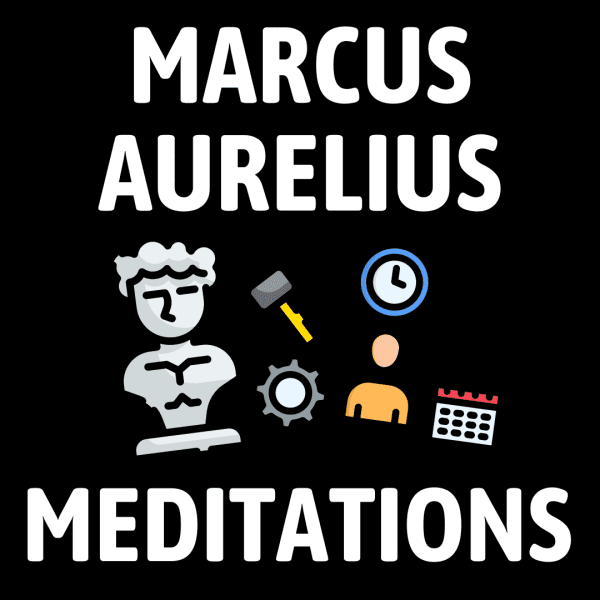
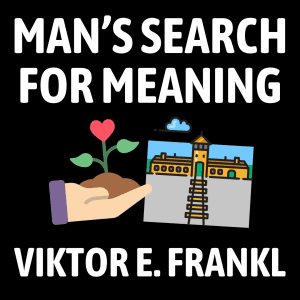



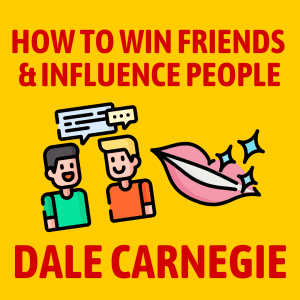


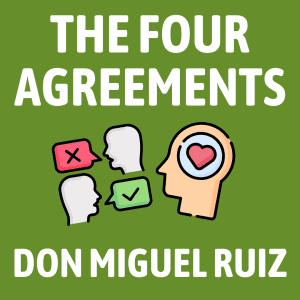
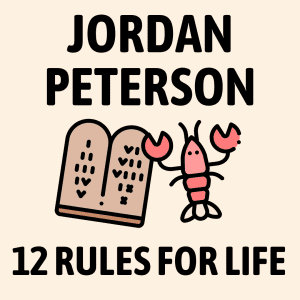





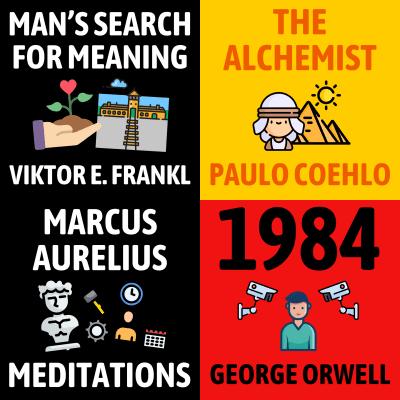


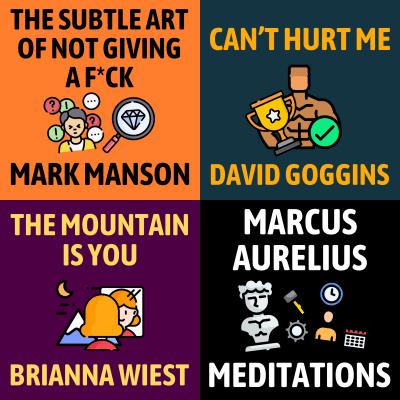

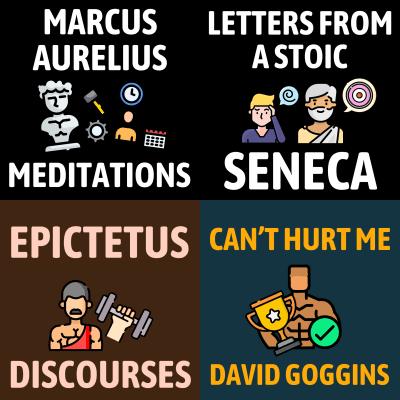
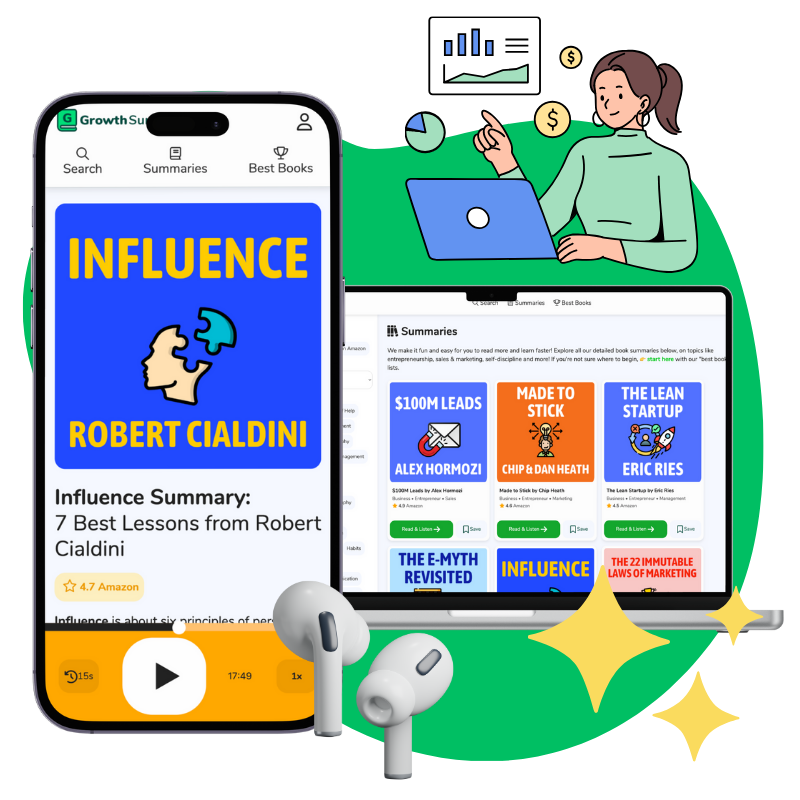
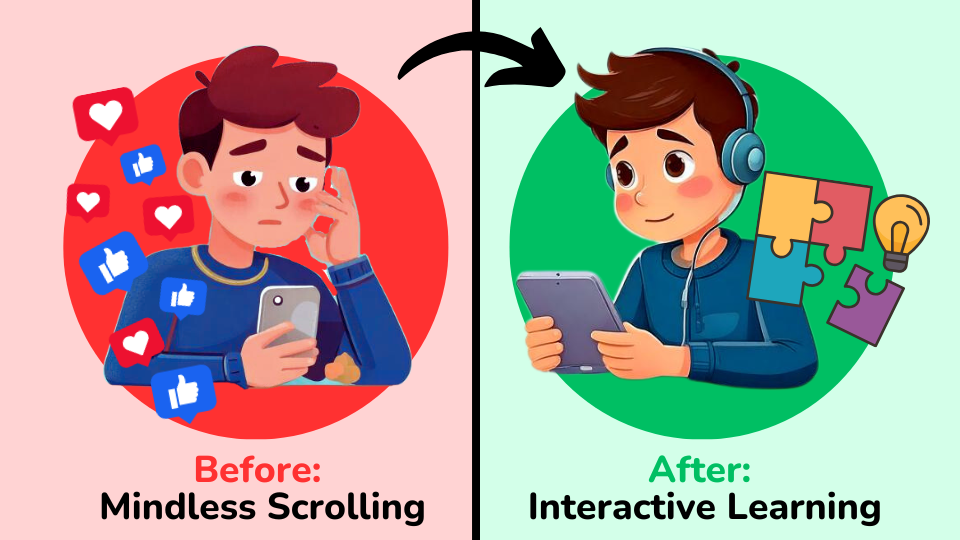








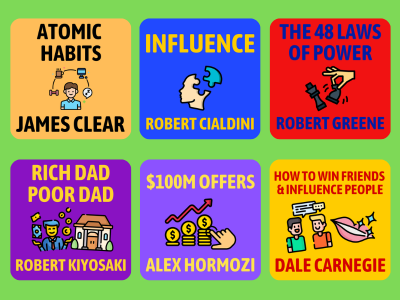
Community Notes